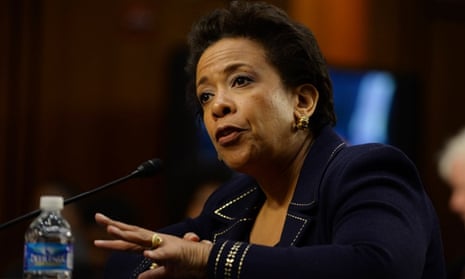After an historic 165-day delay marked by accusations of racism and partisan bias, the US Senate is likely to vote “in the next day or two” on the nomination of Loretta Lynch to be attorney general, majority leader Mitch McConnell said on Tuesday
With at least five Republicans stepping forward to say they will support Lynch, she was expected to be confirmed. Lynch is currently US attorney for the eastern district of New York.
“As soon as we finish the trafficking bill, as I’ve indicated for some time now, we’ll move to the president’s nominee for attorney general, hopefully in the next day or so,” McConnell said.
The apparent breakthrough on the Lynch nomination came with the announcement on Capitol Hill on Tuesday morning that a deal had been struck between Democrats and Republicans on abortion language in a bill to help victims of sex trafficking.
McConnell announced on 15 March, after a partisan fight over the abortion language first broke out, that the Senate would not move on the Lynch nomination until its work on the sex-trafficking bill was complete.
Democrats had objected to inclusion of language in the bill, the Justice for Victims of Trafficking Act, that would have banned the use of victim compensation money for abortions. Republicans insisted that federal funds could not be used for abortions. The deal involved a compromise in which both federal funds and money collected from criminal convicts figured in the compensation fund.
White House spokesman Josh Earnest indicated that the administration would be able to accept the deal. Although Earnest said that President Barack Obama had not seen the language, he said the support for the deal of “a woman’s health care advocate” such as Senator Patty Murray, a Democrat from Washington, was persuasive.
Republicans have come under increasing pressure in recent days to schedule a vote on the Lynch nomination. Their delaying her nomination for legislation meant to protect sex trafficking victims was seen as deeply ironic, given her strong record as US attorney at prosecuting sex traffickers.
Obama last week called the delay on her nomination “embarrassing”, and Senate minority leader Harry Reid threatened to use parliamentary procedure to force a vote.
The delay was of such a different scale than any to have attended a previous modern attorney general nominee that Lynch supporters were at a loss of words to describe it. Valerie Jarrett, the president’s close adviser, settled on this formulation last week: “Loretta Lynch has waited two times as long on the Senate floor for a vote than the seven most recent attorneys general combined.”
The delay was so long that even Alberto Gonzales, the former attorney general under George W Bush widely loathed in some quarters for what critics say was a blithe and extralegal expansion of government surveillance programs and civil rights abuses, said the Republicans in Congress had gone too far in putting off the Lynch confirmation.
“I feel very strongly the president of the United States is entitled to his team,” Gonzales told Politico on Monday. “And so long as his nominee is qualified, then he’s entitled to his team. He’s done his job by nominating Loretta Lynch; the Senate needs to do its job and give her an up-or-down vote.”
Republicans threw up a series of blocks to the nomination, however. At first they objected to a reply Lynch gave Senator Ted Cruz during her confirmation hearing before the judiciary committee, when he asked her whether she agreed with the legal analysis underpinning the president’s executive actions on immigration reform.
“I did find the analysis to be reasonable,” Lynch said.
Many Republicans are expected to vote against Lynch based on the answer, pinning the president’s unpopular immigration policy on his nominee to run the Justice Department. As attorney general, Lynch would be in charge of directing enforcement immigration laws – or not.
But the Republican objections to Lynch ranged beyond the immigration issue. Senator Chuck Grassley, the chairman of judiciary, demanded early on that she expand on her record of cutting deals with banks such as HSBC instead of going for trials and convictions.
At times over the 165 days since her nomination, Republican objections to Lynch seemed sufficiently random that Democrats accused them of not being random at all, but motivated by racism. Democratic whip Dick Durbin accused Republicans of making Lynch “sit in the back of the bus”, in reference to the Jim Crow laws that prevailed in the North Carolina of Lynch’s youth and across the south.
Republicans never questioned Lynch on her merits, but said they disagreed with her view of the president’s immigration policy. The nearly six months Lynch has waited for a vote since she was first nominated is more than twice as long as the sum total delays for the last seven attorneys general combined.
She would be the first African American woman in history to serve as US attorney general.

Comments (…)
Sign in or create your Guardian account to join the discussion